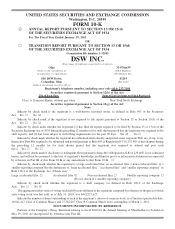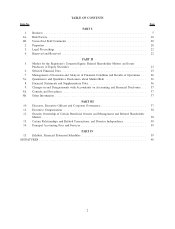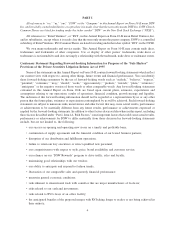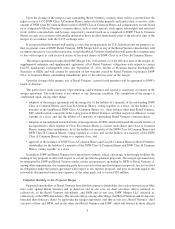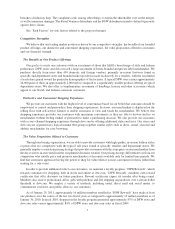DSW 2010 Annual Report Download - page 15
Download and view the complete annual report
Please find page 15 of the 2010 DSW annual report below. You can navigate through the pages in the report by either clicking on the pages listed below, or by using the keyword search tool below to find specific information within the annual report.Risks Relating to Our Business
We opened nine stores in fiscal 2010, plan to open 15 to 20 stores in fiscal 2011 and plan to open ten to
fifteen stores each year for the following three to five years, which could strain our resources and have a
material adverse effect on our business and financial performance.
Our continued and future growth largely depends on our ability to successfully open and operate new DSW
stores on a profitable basis. During fiscal 2010, 2009 and 2008, we opened 9, 9 and 41 new DSW stores,
respectively. We plan to open 15 to 20 stores in fiscal 2011 and plan to open 10 to 15 stores each year for the
following three to five years. As of January 29, 2011, we have signed leases for an additional 9 stores opening in
fiscal 2011 and 2012. During fiscal 2010, the average investment in capital, inventory and new store expenses
required to open a typical new DSW store was approximately $1.8 million.
This continued expansion could place increased demands on our financial, managerial, operational and
administrative resources. We may not achieve our planned expansion on a timely and profitable basis or achieve
results in new locations similar to those achieved in existing locations in prior periods. Our ability to open and
operate new DSW stores on a timely and profitable basis depends on many factors, including, among others, our
ability to: identify suitable markets and sites for new store locations with financially stable co-tenants and landlords;
negotiate favorable lease terms; build-out or refurbish sites on a timely and effective basis; obtain sufficient levels of
inventory to meet the needs of new stores; obtain sufficient financing and capital resources or generate sufficient
operating cash flows from operations to fund growth; open new stores at costs not significantly greater than those
anticipated; successfully open new DSW stores in markets in which we currently have few or no stores; control the
costs of other capital investments associated with store openings; hire, train and retain qualified managers and store
personnel; and successfully integrate new stores into our existing infrastructure, operations, management and
distribution systems or adapt such infrastructure, operations and systems to accommodate our growth.
As a result, we may be unable to open new stores at the rates expected or at all. If we fail to successfully
implement our growth strategy, the opening of new DSW stores could be delayed or prevented, could cost more than
anticipated and could divert resources from other areas of our business, any of which could have a material adverse
effect on our business, financial condition and results of operations.
To the extent that we open new DSW stores in our existing markets, we may experience reduced net sales in
existing stores in those markets. As our store base increases, our stores will become more concentrated in the
markets we serve. As a result, the number of customers and financial performance of individual stores may decline
and the average sales per square foot at our stores may be reduced. This could have a material adverse effect on our
business, financial condition and results of operations.
We have entered into Supply Agreements with Stein Mart, Gordmans and Filene’s Basement. If Stein
Mart, Gordmans or Filene’s Basement were to terminate our supply agreements, close a significant
number of stores or liquidate, it could have a material adverse effect on our business and financial
performance.
Our supply agreements are typically for multiple years with automatic renewal options as long as either party
does not give notice of intent not to renew. For Stein Mart, Gordmans and Filene’s Basement, our contractual
termination dates are December 2012, January 2013 and January 2013, respectively. In addition, the agreements
contain provisions that may trigger an earlier termination. For fiscal 2010, the sales from our leased business
segment represent approximately 7.8% of our total company sales. In the event of the loss of one of these leased
supply agreements, it is unlikely that we would be able to proportionately reduce expenses to the reduction of sales.
The performance of our leased departments is highly dependant on the performance of Stein Mart, Gordmans
and Filene’s Basement. In fiscal 2009, Filene’s Basement filed for bankruptcy protection and its assets were
purchased by a subsidiary of Syms, which now operates stores under the Filene’s Basement name. If Stein Mart,
Gordmans or Filene’s Basement were to terminate our supply agreements, close a significant number of stores or
liquidate, it could have a material adverse effect on our business and financial performance.
11


